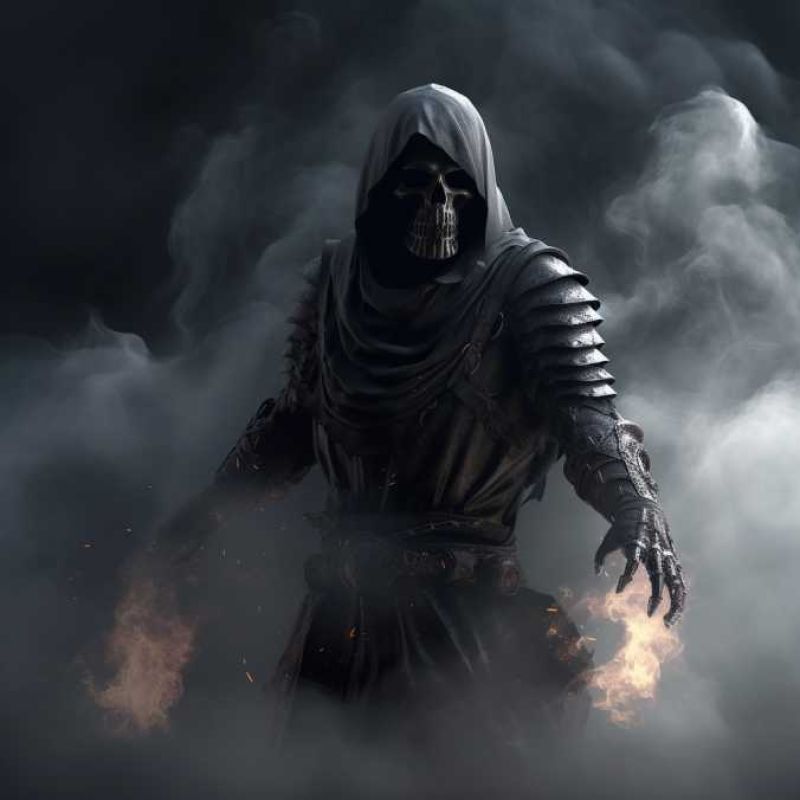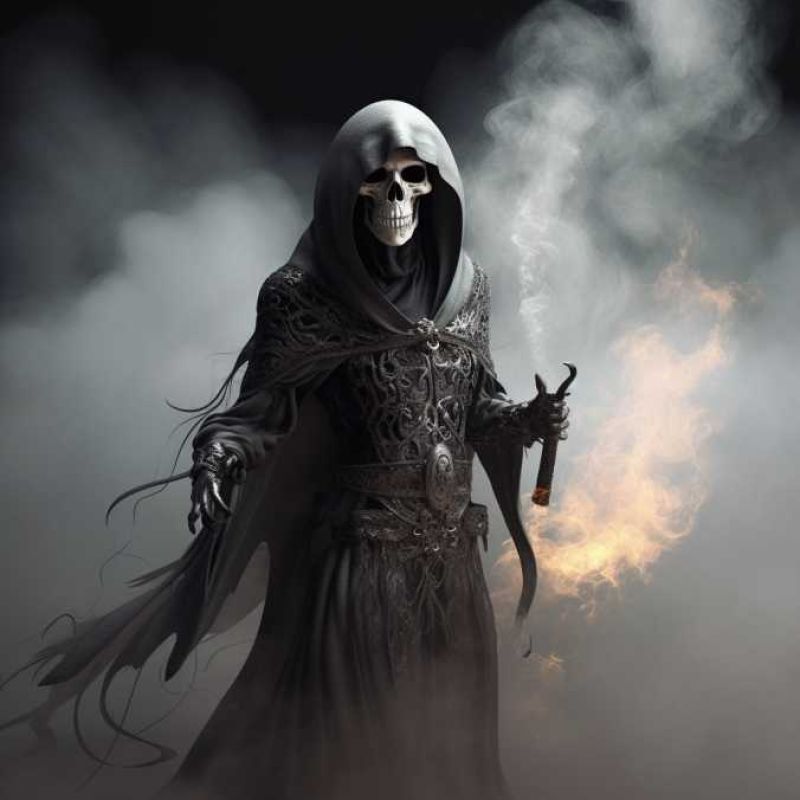 Natural Weapon(s):
Natural Weapon(s):-
Necrotic Touch (4d8)
 Passive Abilities:
Passive Abilities:-
Sunlight Sensitivity-1000 gp
 Abilities:
Abilities:-
Animate Specter
 Attack Abilities:
Attack Abilities:-
Withering Attack300 gp
Glowing eyes pierce the shadows as an incorporeal figure emerges. Without legs, it floats forward, skeletal hands reaching out. Its face, a grinning rictus, anticipates its next kill. The undead entity, a chilling specter from nightmares and ghost stories, exudes an eerie aura, casting a bitter chill down your spine as it advances from the forbidding darkness.
Wraith: The Hollow Malice 🌑
In the shadowed corners of the world, where moonlight dares not linger, the wraith drifts—a specter of pure malevolence, its form a writhing void that hungers for the warmth of life. Its presence is a blight upon the earth: flowers curl into ash, trees groan as their sap turns to dust, and the air grows heavy with the stench of decay. Beasts flee in blind terror, their instincts screaming of an unnatural predator. Even the bravest hearth fires flicker and die, suffocated by the wraith’s aura of despair. To encounter a wraith is to stare into the abyss of oblivion, where hope is devoured and souls are unmade.
🖤 Genesis of the Damned: The Birth of a Wraith
Long ago, in the Age of Shattered Oaths, the mortal realms were stained by betrayal and depravity. When a soul, steeped in unspeakable sin or bound by a pact with the fiends of the Abyssal Depths, faced its final reckoning, it sometimes defied the natural order. Rather than descending to the torment of the Lower Planes, such a soul—saturated with the black ichor of negative energy—imploded in a moment of cosmic refusal. Its essence collapsed, forging a wraith: a soulless husk of malice, forever trapped in the mortal plane where it perished.
These wraiths are not mere ghosts but abominations born of self-destruction. The mortal they once were is erased, leaving only a predatory void that remembers nothing of joy or love. Legends whisper of the first wraith, born in the cursed city of Vaelor, where a sorcerer-king named Zorathys bartered his entire court to a demon lord. When his soul rebelled against its damnation, it tore a rift in reality, birthing a wraith that reduced Vaelor to a wasteland of ash and silence. Since then, wraiths have haunted the world, each a testament to the perils of hubris and corruption.
🌫️ A Formless Terror: The Wraith’s Nature
A wraith has no substance, its body a shifting miasma of shadow and despair. It glides through stone, flesh, and steel as effortlessly as a mortal strides through mist, leaving only a chill that pierces bone and soul. Its visage is a nightmare: hollow eyes that burn with a sickly, pale light, and a maw that yawns like a wound in reality, promising annihilation. To touch a wraith is to feel life itself unravel, as if the world’s vitality is siphoned into an endless void.
Though wraiths retain faint echoes of their mortal lives, these are not memories but cruel distortions—fleeting images of a lover’s face, the warmth of a childhood home, or the thrill of a long-forgotten triumph. Such fragments are rare and fleeting, like stars glimpsed through a storm. A wraith might hesitate before a crumbling statue that mirrors a lost obsession or spare a descendant of a once-cherished friend, but these moments are fleeting. The wraith’s hatred for its former self fuels its wrath, and it seeks to erase all traces of the life it can no longer claim.
⚔️ Lords of the Grave: Wraiths as Commanders
In the forsaken necropolises and battlefields where death reigns, wraiths ascend as dread sovereigns of the undead. They wield the power to bind lesser spirits, wrenching the souls of those slain in violence from their bodies to create specters—spiteful shades that mirror their master’s loathing for the living. These spectral thralls form the vanguard of a wraith’s army, their wails a dirge that heralds doom.
Wraiths are not mere destroyers but strategists of annihilation. From their lairs in ruined citadels or beneath barrow-mounds, they plot the downfall of kingdoms. The War of the Hollow Crown, a century-long conflict in the realm of Dravenholt, was orchestrated by a wraith known as the Silent Tyrant. Its legions of specters and ghouls ravaged the land, leaving fields barren and rivers choked with corpses. Even when mortal armies drove the Tyrant back, the lands it touched were so blighted that survivors starved, their crops reduced to dust and their wells poisoned by the wraith’s lingering malice.
🕸️ The Blighted Wake: A Wraith’s Influence
The mere passage of a wraith scars the world. Grass withers to brittle stalks, and forests twist into grotesque parodies of life, their branches clawing at the sky like skeletal hands. Villages near a wraith’s haunt fall silent, their inhabitants either fled or drained of life, their bodies left as husks curled in eternal agony. The air grows thick with an oppressive silence, broken only by the faint, mournful keen of the wraith itself—a sound that chills the heart and saps the will to fight.
Scholars of the arcane, such as the reclusive Order of the Saffron Veil, believe wraiths are drawn to places already touched by tragedy: battlefields soaked in blood, plague-ridden towns, or temples defiled by betrayal. These sites amplify a wraith’s power, allowing it to spread its influence like a plague. The village of Thornskull, once a thriving hamlet, now lies in ruins after a wraith emerged from the grave of a traitor knight. Its fields are a gray wasteland, and the few survivors speak of shadows that whisper their deepest fears in the dead of night.
🛡️ Confronting the Unseen: Tactics and Lore
To face a wraith is to court death, for no mortal blade can strike its formless essence. Only weapons imbued with holy light or forged with ancient runes of banishment can harm it, and even then, the battle is perilous. Priests of the Sunfather, clad in sanctified armor, have been known to drive wraiths back with radiant prayers, though many perish in the attempt, their faith consumed by the wraith’s despair. Mages wielding spells of force or dispelling magic may disrupt a wraith’s cohesion, but such efforts require precision and courage, for a wraith’s wrath is swift and merciless.
Folklore offers scant protection: iron charms inscribed with protective sigils, worn about the neck, are said to ward off a wraith’s touch, though their efficacy is dubious. The wise avoid wraith-haunted lands altogether, marking their borders with circles of salt and blessed stones. Yet some, driven by desperation or greed, seek the treasures rumored to lie in wraith lairs—relics of their mortal lives, now cursed by their malevolence. Such quests often end in tragedy, for a wraith guards its past with jealous fury.
📜 The Eternal Curse: A Wraith’s Legacy
A wraith is not merely a creature but a wound in the fabric of existence, a reminder of the fragility of mortal souls. In the chronicles of the world, they are omens of ruin, their emergence heralding dark times. The fall of the Empire of Lysar is said to have begun when a wraith rose from the tomb of its last emperor, its curse spreading famine and madness across the land. Even now, bards sing of the Wraithmoors, a desolate expanse where no life grows, and the air hums with the sorrow of a thousand lost souls.
For adventurers, a wraith is both a terror and a challenge. To slay one is to defy oblivion itself, earning a place in legend. Yet the cost is high, for those who survive a wraith’s touch often carry its shadow in their hearts, haunted by visions of the void. In a world where darkness gathers, the wraith stands as a testament to the price of sin—and a warning to those who tread the path of damnation.
Environment:
![]()
👻💨 Apparitions: Spectral Heralds of Decay and Despair
Apparitions are vengeful spirits, tethered to the mortal realm by unresolved grievances and seething resentment. 🌫️ These spectral entities drift through the world, their translucent forms radiating an aura of rot and ruin that withers life and beckons the undead. Driven by unfinished business and fueled by rage, they are both a haunting tragedy and a deadly menace, their presence chilling the soul as surely as it blights the land. In any campaign, apparitions are poignant and perilous, their lingering emotions and decaying influence weaving tales of sorrow, vengeance, and redemption.
🕳️ Ethereal Form: Twisted Echoes of Life
Apparitions manifest as ghostly figures, their translucent bodies shimmering with an eerie, sickly glow. 🖤 Often, they resemble their living selves, but their forms are warped by resentment—eyes burning with malice, features contorted in anguish, or limbs trailing into wisps of shadow. A knight’s apparition might clutch a spectral blade, while a betrayed lover’s form drips with illusory tears. Their ethereal nature allows them to glide through walls and hover above the ground, untouchable by mundane weapons yet vulnerable to holy light or radiant magic that sears their corrupted essence.
Game Masters can tailor an apparition’s appearance to reflect its story—a merchant with coins spilling from spectral wounds, or a child clutching a broken toy. Their visual distinctiveness sets the tone for encounters, hinting at the emotions and events that bind them.
🌿 Signs of Decay: Blight of the Spectral Wake
Wherever an apparition lingers, the world sickens. 🌑 Plants wither to brittle husks, wood warps and rots, and the air turns cold and heavy with a stagnant, graveyard chill. This tangible aura of decay is unmistakable, marking their haunts with blackened earth or crumbling stone. The presence of an apparition draws undead—shambling zombies or wailing spirits—amplifying the danger of their domain, while living creatures suffer, their vitality sapped by the oppressive miasma.
GMs can use these signs to build dread, with players noticing wilting crops or rancid water as clues to an apparition’s influence. The decay can escalate with the apparition’s rage, turning a haunted manor into a rotting labyrinth or a village into a necrotic wasteland, creating dynamic environments for exploration or combat.
🗝️ Unfinished Business: Anchors of the Soul
Apparitions are bound by unresolved tasks from their lives, their spectral existence a desperate bid to complete what death denied them. ⚖️ A warrior might seek vengeance for a betrayal, haunting their killer’s lineage; a guardian might protect a lost treasure, unable to rest until it’s safe; a parent might linger to fulfill a broken promise to a child. These goals drive their actions, and resolving them—through aid, trickery, or force—can lay an apparition to rest, freeing its soul from torment.
Understanding an apparition’s purpose is key to confronting it. Some can be reasoned with, their rage soothed by fulfilling their desires, while others are too consumed by hatred to negotiate. GMs can craft unique tasks tied to the campaign’s lore—a forgotten oath to a fallen god, or a love letter never delivered—making each apparition a narrative puzzle that rewards empathy or cunning.
⚔️ Resentment and Rage: Fury of the Forsaken
An apparition’s heart burns with intense emotions—grief, betrayal, or unquenched wrath—that fuel its spectral might. 😡 In combat, they unleash this rage, hurling necrotic blasts, draining life with a chilling touch, or summoning decayed remnants of their past to fight. Their ethereal forms shrug off physical blows and necrotic forces, but holy relics, radiant spells, or artifacts tied to their life—like a betrayer’s dagger or a lover’s locket—can pierce their defenses, unraveling their essence.
Their emotions also shape their behavior. A sorrowful apparition might plead for aid, while a vengeful one hunts relentlessly. Players who discern these feelings—through investigation or magic—can turn the tide, calming the spirit with empathy or provoking it to reckless fury. GMs can use this emotional core to create dynamic encounters, where combat blends with roleplay, and understanding the apparition’s pain becomes as crucial as striking it down.
🌌 Shadows of a Shattered Past
Apparitions are more than spectral foes; they are echoes of lives left incomplete, their decay a mirror to their inner torment. 🖌️ In a campaign, they serve as haunting mysteries, their haunts revealing forgotten sins or buried truths. Players might aid an apparition to free a cursed village, battle one to claim its guarded relic, or uncover its story to prevent a greater evil. Their origins can anchor to any setting—a scorned priest in a desecrated temple, a sailor lost to a storm-haunted reef, or a rebel executed in a tyrant’s dungeon—offering GMs endless ways to enrich their world.
In realms like Zin, where ancient grudges linger, apparitions might drift through war-scarred ruins, their rot seeping into the land’s wounds. To face an apparition is to grapple with the past’s weight, a challenge that tests compassion as much as courage. Heroes who resolve an apparition’s pain may bring peace to a haunted place, but those who falter risk falling to the decay that follows in its wake, forever marked by the specter’s wrath. 👁️🗨️
 Special Senses:
Special Senses:-
 Nightsight: +60
Nightsight: +60
-
 Ghostsight: +60
Ghostsight: +60
 Damage Type Immunity:
Damage Type Immunity:-
 Cold
Cold -
 Necrotic
Necrotic
 Damage Type Vulnerability:
Damage Type Vulnerability:-
 Radiant
Radiant
 Immune to Status Effect:
Immune to Status Effect:-
 Bleeding (2d6)
Bleeding (2d6) -
 Charmed
Charmed -
 Chilled
Chilled -
 Freezing
Freezing -
 Frightened
Frightened -
 Frozen
Frozen -
 Grappled
Grappled -
 Grappling
Grappling -
 Immobile
Immobile -
 Paralyzed
Paralyzed -
 Petrified
Petrified -
 Prone
Prone -
 Restrained
Restrained -
 Sleeping
Sleeping -
 Starving
Starving -
 Suffocating
Suffocating
 Persistant/Permanent Status Effect:
Persistant/Permanent Status Effect:-
 Incorporeal
Incorporeal
-
 Damage Mitigation:
+2
Damage Mitigation:
+2

